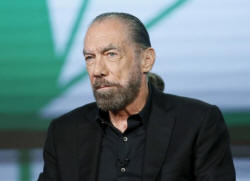|
Q&A: John Paul DeJoria
learned how to bottle success
 Send a link to a friend
Send a link to a friend
[November 17, 2016]
By Chris Taylor
NEW
YORK(Reuters) - Most entrepreneurs dream of catching lightning in a
bottle once in their lives. Billionaire John Paul DeJoria has managed to
make a habit of it.
The Los Angeles-bred entrepreneur, a son of Greek and Italian
immigrants, hit the jackpot with ventures like the Paul Mitchell line of
hair products and Patron tequila.
For the latest in Reuters' Life Lessons series, DeJoria, 72, talked
about the sales drive that took him from selling Christmas cards
door-to-door as a kid, to becoming one of the most successful
entrepreneurs on the planet.
Q: What life lessons about money were instilled in you growing up?
A: My mother always told my brother and I that we can do anything as
long as we kept applying ourselves. She also told us to remember to give
to those who have less than you. These two things have always inspired
my personal philosophy, and everything I do.
Q: What did you learn from your early gigs, selling everything from
Christmas cards to encyclopedias?
A: A very important lesson: Persistence and overcoming rejection. Going
door-to-door selling is exhausting and often times discouraging. But you
have to be just as enthusiastic on door number 50 as you were on door
number 1 to make a sale. Successful people do what unsuccessful people
don’t want to do.
Q: What were your shoestring early days with the Paul Mitchell line like
- even living out of your car at the beginning?
A: I started John Paul Mitchell Systems in 1980, in one of the worst
economic environments when inflation was at its highest and people were
waiting in lines around the block to get gas. I was, in fact, homeless
and living out of my car when our first backer pulled out. But Paul
Mitchell and I started JPMS with a borrowed $700 and an answering
machine. We even decided on the iconic black-and-white logo and
packaging because we couldn’t afford to print in color.
Q: How did you realize there was big potential with ultra-premium
tequila when you launched Patron?
A: I received a sample of tequila that was smoother than anything I had
ever tasted, and was told that there was a tequila “chef” out there that
could make it even smoother. You could actually sip it, instead holding
your breath. So right then I knew there was a potential market there.
Why? Because people want to treat themselves.
Q: As an investor are you more of a risk-taker, or more conservative in
where you put your money?
A: I look at my investments in three ways: Part of my money goes into
helping others and making the world a better place to live. The next
portion involves risk by building businesses and hiring good people.
Finally, there is a portion that goes to more conservative investments,
such as stocks and real estate.
[to top of second column] |

Entrepreneur John Paul Dejoria from "Follow the Leader",
participates in a CNBC Primetime panel during the Television Critics
Association (TCA) Cable Winter Press Tour in Pasadena, California,
January 14, 2016. REUTERS/Danny Moloshok

Q: When it comes to philanthropy, how do you sort through all the
requests and decide where you can make a meaningful impact?
A: I established JP’s Peace, Love & Happiness Foundation as a hub for
all charitable investments to help with that. The organizations span the
core values of my companies: Sustainability, social responsibility and
animal-friendliness.
Q: Even though you have been so successful, do you still try to live
below your means like in the early days?
A: Yes. I can have a big yacht now if I wanted one, but it makes no
sense to me. It is better to rent it, rather than flaunt it. Plus it is
a waste to have something like that to just sit there. I would rather
put that money into something that can help others and the planet.
Q: You have a number of children, so what lessons about money and life
do you try to pass down to them?
A: I had a tradition where they all received a weekly allowance starting
at the age of 10. It was important that they learned the value of money.
Of course, this all had to change when my youngest son turned 14 and
that $10 disappeared in one trip to the movies. It couldn’t even get him
popcorn and a soda. That is when I realized I had to increase it to $20
a week.
(Editing by Beth Pinsker and Marguerita Choy)
[© 2016 Thomson Reuters. All rights
reserved.] Copyright 2016 Reuters. All rights reserved. This material may not be published,
broadcast, rewritten or redistributed. |